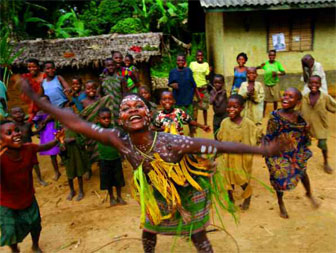Despite government and World Bank assurances to the contrary. a new report from Greenpeace finds that illegal logging is rampant in the Democratic Republic of Congo (DRC).
The report, Carving up the Congo, reveals that in spite of a 2002 moratorium on new logging, over 15 million hectares of rainforest have been concessioned to loggers with little regard to the environmental impact or compensation to affected communities.
“While few new forest areas have been protected since the 2002 moratorium, by April 2006 members of the transitional DRC government had signed 107 new contracts with logging companies covering more than 15 million hectares of forest,” the report stated.
|
©Greenpeace/Reynaers |
Greenpeace says the World Bank, which is the largest donor to DRC, has failed to control logging. The bank has even conceded that mandated logging proceeds have failed to reach local communities with logging companies instead giving villages gifts of salt and beer worth less than $100.
“In a context of corruption and poor governance in the DRC, the World Bank’s attempts to reform the forestry sector are currently failing to control the expansion of logging,” stated the report.
The report warns that deforestation in Congo is threatening biodiversity, worsening climate change, and short-changing the millions of people that live in the Congo basin.
“Predictions for future deforestation in Central Africa estimate that by 2050 forest clearance in the Democratic Republic of the Congo (DRC) will release up to 34.4 billion tonnes of CO2, roughly equivalent to the UK’s CO2 emissions over the last sixty years. The DRC risks losing more than 40% of its forests, with transport infrastructure such as logging roads being one of the major drivers.”
The Greenpeace report urges the World Bank to cancel all logging titles issued since May 2002 and extend the moratorium on all new logging concessions until the timber industry is properly under control. Further, it said that the international community should finance sustainable development initiatives as well as conservation efforts in the country.
“Rich nations must together develop a permanent financing regime that maintains the environmental services provided by the DRC’s intact rainforests. They must also support environmentally responsible and socially just development based on community-level initiatives, and take much more stringent steps to close the international market to illegal and conflict timber,” stated the report.
“The international community must support the development of an international innovative financing mechanism that will provide the necessary funding for the long-term conservation of forests, to ensure that the safeguarding of intact forests is made much more economically attractive than their systemic industrial exploitation or clearing for agricultural conversion.”
Related articles
Congo cancels logging contracts, calls for sustainable forest management.
(04/09/2007) The new government of the Democratic Republic of Congo (DRC) cancelled more than 20 illegally-granted logging contracts which covered nearly three million hectares (7.4 million acres) of forest, according to a report from AFP. The announcement came at the International conference on the sustainable management of the forests in the DRC (ConForDRC) held February 26-27 in Brussels. At the conference policymakers agreed that Congo should maintain its moratorium on new logging and provide legal recognition for the rights of indigenous forest dwellers. There was wide support for Congo’s participation in the Coalition of Rainforest Nations’ proposal to seek compensation for forest conservation.
Emissions proposal could generate $200m/year for DR Congo. The Democratic Republic of Congo could earn hundreds of millions of dollars through a global warming proposal under consideration this week at U.N. climate negotiations in Nairobi, Kenya. At talks last year in Montreal, a coalition of tropical developing countries lead by Papua New Guinea proposed a rainforest conservation compensation initiative whereby industrialized nations would pay them to protect their forests to offset heat-trapping gas emissions. After endorsements by the World Bank, the United Nations, and the United States, the plan will likely be discussed in greater detail at the Nairobi conference.
This article uses quotes and information from Greenpeace’s “Carving up the Congo” report.















